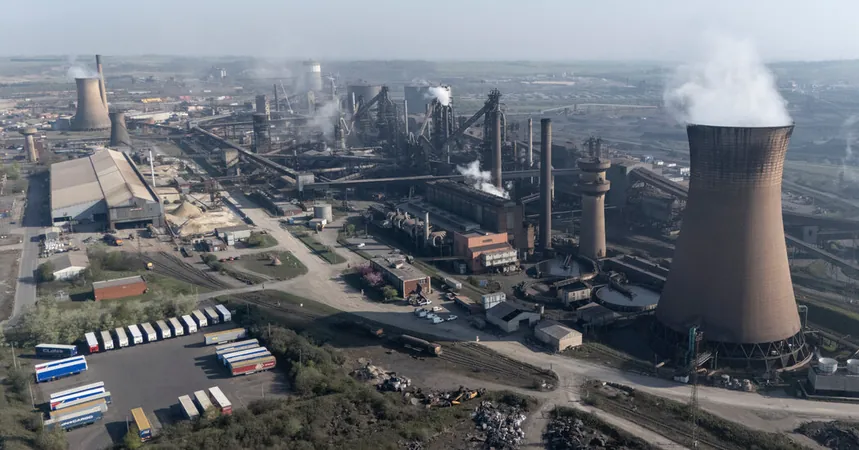
British Government Seizes Control of Last Major Steel Mill: A Bold Move to Save Jobs
2025-04-12
Author: Chun
In a Dramatic Turn of Events
In a bold and unexpected move, the British government has taken control of the nation’s last major crude steel mill, located in Scunthorpe, as part of efforts to avert a potential disaster for thousands of workers. Lawmakers were urgently called back from vacation to approve emergency legislation, signaling the government’s commitment to preserve the facility amid fears of impending closures.
Staving Off Job Losses
The intervention comes as the Chinese-owned Jingye Group, which operates the mill, was poised to shut down blast furnaces that could cost approximately 2,700 jobs. With Britain's steel industry in decline—crude steel production has plummeted by nearly 50% over the past decade—the government’s decision underscores the urgent need to protect vital jobs and local economies.
A Turbulent Industry
The steel sector in the UK battles soaring energy costs and fierce international competition, particularly from China, which produces more than half of the world’s steel. Additionally, the tariffs imposed by the Trump administration on imported steel have further complicated the landscape for British producers.
Navigating a Financial Quagmire
The government, led by Prime Minister Keir Starmer, faces a precarious situation. With British Steel allegedly losing around £700,000 daily, critics warn that the government's actions might effectively amount to nationalization, despite official denials. The administration is taking control of management while seeking a partner for greener steel production, reflecting the tension between environmental concerns and economic realities.
Political Implications and Union Pressure
Starmer's government is under pressure from trade unions and concerned citizens who remember the heavy job losses following the closure of Tata Steel’s Port Talbot facility. The Community Union’s Alasdair McDiarmid voiced significant concerns over potential job cuts, stressing the anger and anxiety within the steelworker community.
Strategic Choices for the Future
In a world increasingly leaning towards economic nationalism, the decision to retain the Scunthorpe plant is seen as pivotal for maintaining domestic steel production capabilities. The plant currently houses the last two operating blast furnaces in the UK—essential for producing high-quality steel.
Fox or Falcon? The Battle Over Resources
Reports suggest that Jingye may have been deliberately restricting raw materials to hasten a shutdown, intensifying the conflict. In response, local leaders, including Mr. Reynolds, have proposed substantial aid to transition to electric furnaces—an environmentally friendly alternative that could reshape the industry.
A Fight for Survival
With the stakes dramatically high for both workers and the future of steel-making in Britain, the government’s latest maneuver reflects a desperate yet strategic attempt to navigate a challenging industrial landscape. As tensions flare between stakeholders, the coming weeks will be crucial in determining the fate of Britain's ailing steel industry.



 Brasil (PT)
Brasil (PT)
 Canada (EN)
Canada (EN)
 Chile (ES)
Chile (ES)
 Česko (CS)
Česko (CS)
 대한민국 (KO)
대한민국 (KO)
 España (ES)
España (ES)
 France (FR)
France (FR)
 Hong Kong (EN)
Hong Kong (EN)
 Italia (IT)
Italia (IT)
 日本 (JA)
日本 (JA)
 Magyarország (HU)
Magyarország (HU)
 Norge (NO)
Norge (NO)
 Polska (PL)
Polska (PL)
 Schweiz (DE)
Schweiz (DE)
 Singapore (EN)
Singapore (EN)
 Sverige (SV)
Sverige (SV)
 Suomi (FI)
Suomi (FI)
 Türkiye (TR)
Türkiye (TR)
 الإمارات العربية المتحدة (AR)
الإمارات العربية المتحدة (AR)